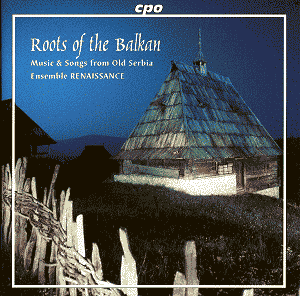The rustic images on the cover of the CD booklet
tell you everything and nothing about the music contained therein.
The rural idyll illustrated shows one side, perhaps, of the double
edged sword of the Serbian national character and history. Yet
many of the slower pieces on this disc speak voluminously of the
long standing turmoil and suffering of the Serbian and other nations
which inhabit Europe's Balkan peninsula.
The twelve members of Ensemble Renaissance perform
these pieces with true authority and, to this listener, they are
authentic to the last. The group utilises upfront fiddles and
bagpipes in addition to more local/regional instruments (saz,
kaval etc.). The dance tunes, with their unusual and shifting
time signatures, are everything you might imagine had sparked
the imagination and creative impulse
of Bartók on his field excursions to research the folk music of
this and adjacent areas. The laments are indeed gut-wrenching
stuff - Vojka Djordjević and Ljudmila Gross send shivers
down the spine with their interpretations of the slower
"songs". There are echoes of the work of, say, Norwegian folk
singer Agnes Buen Garnås in her ground-breaking collaboration
with Jan Garbarek (pre-Hilliards and Mari Boine!). This takes
me to my main interpretative point about this recording and others
of its ilk, namely that it brings home once again, as I have mentioned
before in these pages, the connections, musically speaking, between
Celtic, Nordic (and let's face it, British music is more or less
an amalgam of those) and more Eastern (Balkan, Baltic, Russian,
Indian, Chinese …) musical traditions. As an outsider, and with
the potential only for a limited number of hearings, I am happy
to sacrilegiously suggest that it is somewhat difficult to distinguish
musically between the different areas of Serbia and its more remote
outposts in Kossovo etc. However the music from the latter and
from the east of the region does sound more Byzantine, middle-eastern
even, in origin. Given the bête noire status of states
such as Serbia, financially and politically speaking, I imagine
that it is gratifying enough that this disc has actually been
released at all. It is a profound and moving listening experience
and I urge you to hear it, if you are at all interested in the
fascinating musical traditions of this part of Europe.
A marvellous antidote to "globalised" "crossover"
and not a synthesiser or drum machine in earshot to boot. CPO
is to be congratulated on publicising this group and their honest,
heartfelt music.
Neil Horner
